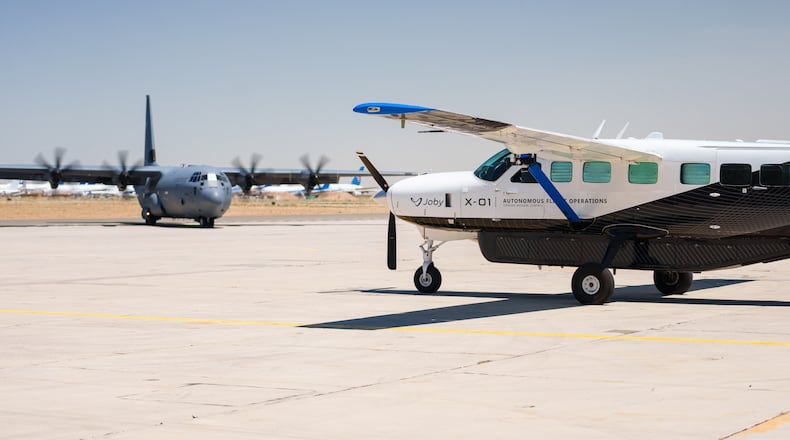The aircraft autonomously flew between nine locations while monitored by what Joby called a “safety pilot.”
The plane completed an autonomous taxi, take-off, and landing at each location, including sites that had not been previously visited by the aircraft, Joby said.
The Cessnas are cheaper to operate compared to traditional Air Force cargo aircraft, the Air Force Research Laboratory (AFRL) said in its account of the exercise.
AFRL cited fiscal year 2023 defense figures, saying the operating cost per hour for a C-130J Hercules is $7,671, and the operating cost per hour for a C-17A Globemaster III is $20,941 per hour.
AFRL is based at Wright-Patterson Air Force Base.
Credit: Matthew Clouse
Credit: Matthew Clouse
Joby said it remotely supervised the Cessna using a laptop and a satellite communications terminal, both of which fit in a backpack.
“We were pleased to continue demonstrating the capabilities of our autonomy technology during Agile Flag 24-3, where we completed dozens of fully autonomous aerial missions and showcased an ability to perform rapid resupply,” Maxime Gariel, autonomy lead at Joby, said in a statement. “We look forward to continuing to work with the U.S. Air Force as we further develop the suite of technologies that could enable greater automation or full autonomy, first on the Caravan and then on numerous other aircraft types.”
Earlier this year, the Xwing team took part in a similar exercise, completing more than 2,800 miles of autonomous flight.
“The return on investment for the U.S. Air Force with this technology is significant. By using it to handle smaller cargo, we can preserve cargo aircraft for more critical tasks like transporting large parts or engines,” said Col. Max Bremer, Air Mobility Command Special Access Program management officer. “This not only enhances the overall capability of the cargo fleet but also ensures they are used where they are most needed.”
Production of components for Joby Aviation electric vertical takeoff and landing vehicles (eVTOL) will begin in Dayton early next year, Greg Bowles, Joby’s head of government relations and regulatory affairs, told the Dayton Daily News earlier this month.
About the Author


